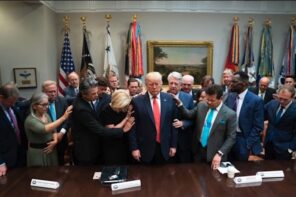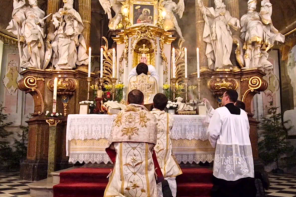Last week, AP published a small, albeit important article, “Many faith leaders say no to endorsing vaccine exemptions,” noting that the leadership of certain Eastern Orthodox churches, Catholic dioceses, mainline Protestant denominations, Mormon leadership, Orthodox Jewish and Muslim organizations, and even prominent pro-Trump evangelicals like Pastor Robert Jeffress, are refusing to issue letters of religious exemption to members of their flocks in addition to encouraging these members to get vaccinated against Covid-19. This is a good thing, and it should be covered.
But to frame this story the way AP does essentially heaps praise on these religious leaders and institutions for upholding a bare minimum of good citizenship without stopping to ask two critical, related questions that would lead us to a more complex, nuanced picture: 1) Are the records of these institutions and leaders on pandemic response, vaccination, and related issues consistent with their current posture?; and 2) Why do right-wing extremists and conspiracy theorists find membership in some of these religious institutions attractive in large enough numbers that their leaders feel compelled to publicly distance themselves from their flocks? (And speaking of numbers, the inclusion of data on religious affiliation and support for vaccine exemptions would have improved the AP article significantly.)
But the bigger story here, which slides into the background, is that America’s right-wing politics of “religious freedom” running amok is driving lawsuits that result in churches—including one wildly popular evangelical megachurch—gaining the legal “right” to undermine public health during a pandemic. Never mind that precedent has deemed such exemptions unconstitutional. Given the current state of the federal courts and the Supreme Court—a state they’re in thanks largely to white evangelicals and traditionalist Catholics—all bets are off.
While the AP story at least observes that some religious institutions have staked a position in favor of vaccine exemptions, including some U.S. Catholic dioceses that are openly breaking with Pope Francis on the issue, it still fails to supply much relevant context. The upshot is that the religious leaders and institutions are portrayed as good citizens in the fight against Covid, even though they clearly bear varying degrees of responsibility for making the extremists in their ranks feel welcome. In addition, their public statements on these matters cost them nothing, apart from perhaps a little discontent among their flocks.
Take the example of the LDS Church’s Brigham Young University. BYU could choose to be among the over 1,000 campuses that already require vaccination for students and employees, but it doesn’t, which means the LDS church is hardly being a leader or taking a truly robust stance in favor of public health. And megachurch pastor Jeffress, he of the infamous “Make America Great Again” church choir performance, spent four years carrying water for Trump, which surely went a long way to stoke the conspiratorial fervor of the churchgoing evangelical Republican base. Highlighting his newfound support for the most basic public health measure of all without addressing this context is about as responsible as quoting a “reformed” fox on its “sincere concern” for the welfare of farm chickens.
What constitutes good journalism? Any answer to that question that a society reinforces through government regulation, journalistic training, and elite media outlets will have profound implications for the health and functionality of both civil society and politics. If we think of journalism as a public good, which I consider the most ethical way to think of it, then we’ll want journalists to be both hard-hitting and fair, to ask tough questions to those on all sides of important issues who have power or influence, and to frame their questions and write-ups in ways that uphold democratic values, norms, and principles as well as information literacy. For example, when you cover American Nazis—which you obviously should—framing is critical. Yet America’s legacy media can’t even clear the low bar of not glorifying Nazism by prominently describing young white supremacists with social media skills as “dapper.”
In addition, the breezy “bothsidesism” that characterizes far too much contemporary journalism undermines democracy, as it allows (almost always right-wing) bad actors to generate “controversy” where there is none—among relevant experts, at least—and treats these bad actors’ narratives as equivalent to the evidence-based conclusions of the experts, thereby normalizing extremism and eroding the public’s ability to get at the truth.
Civil society can’t function without easy access to good information. As I wrote recently here on RD, “Post-truth politics is a powerful tool for authoritarians.” By neutralizing damaging facts with bogus counter-narratives, corrupt individuals who already have power, money, and privilege can more easily exploit those advantages to maintain their ability to oppress the marginalized. Information climates don’t get more undemocratic than that.
When it comes to religion journalism, stories are often framed in ways that exhibit pro-religion, and especially pro-Christian, bias. Christian institutions and their leaders, who are powerful and should thus be asked tough questions, are often treated as underdogs. Good journalism—journalism that represents a democratic public good—should be dedicated to holding the powerful accountable, with no special treatment or deference for people and institutions whose power derives from religion (especially if that religion is hegemonic, as Christianity is in America). And yet the field of religion journalism is characterized by a self-imposed myopia regarding what kind of stories about religion should be told (positive) and who counts as stakeholders worth talking to in the coverage of religious groups (only adherents, especially leaders).
To be clear, my position is that anyone directly affected by the politics of the religious group in question is a stakeholder, which means that when it comes to the groups that constitute the Christian Right, women and anyone who may someday need abortion care, members of the LGBTQ community, people of color, non-Christians, and exvangelicals and other former right-wing Christians are all significant stakeholders. Most religion stories, however, don’t consider these perspectives, and that’s just one reason that the end products read as unduly deferential.
A reasonably fair-minded person could reach this conclusion simply from reading widely across the religion journalism landscape. The patterns are there. But as someone who covers the religion beat, albeit mostly as a commentator and occasionally as an advocacy journalist, I’ve had some opportunities to see, as it were, how the sausage is made. I’ve dealt with defensive editors watering down my takes on the Christian Right, for example, but that’s not the half of it.
While attending Religion News Association’s annual conference in 2019, which I wrote about on my (currently much neglected) blog, I was able to observe firsthand how many religion reporters have a chip on their shoulder about the people and institutions they cover. They seem to think religion is “poorly understood,” and that understanding it “well” means painting religious groups in as positive a light as possible.
There’s a very strange sense not only that religious institutions are ipso facto social goods, even when they are powerful and demonstrably riddled with corruption and abuse, but also that religion is somehow under attack and in need of protection from intrepid journalists. (If you want to see this pattern “in the wild,” just take a little time to read the Get Religion blog, but don’t say I didn’t warn you.)
The social and political harm consistently done by conservative Christians was so far outside the mainstream at RNA’s 2019 conference that, at a well-attended panel on Christian nationalism, when a speaker asked members of the substantial audience to raise their hands if they’d ever heard of Project Blitz—a highly coordinated, multi-state campaign including hundreds of lawmakers to push a set of model bills in an effort to expand the Christian nationalist agenda—only a few hands (including my own) went up.
The field of religion journalism in America is, by and large, in an even worse state than our legacy media generally, and that’s saying something. This is a serious problem, given the disproportionate power that (predominantly white and conservative) Christians in particular have in American society, and the political influence they exercise. American civil society (such as it is) is riddled with groundless faith in faith, but good journalism—even journalism about faith—shouldn’t come from a place of faith in anything. Good journalism should instead come from a place of skepticism, so that it can fulfill its function as a social good, holding the powerful accountable.





